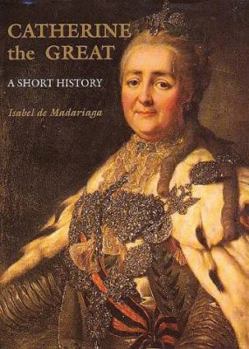Catherine the Great: A Short History
Select Format
Select Condition 
Book Overview
The most informative, balanced, and up-to-date short study of Catherine the Great and her reign, written by an eminent scholar of Russian history "Not just another biography of Catherine but a... This description may be from another edition of this product.
Format:Hardcover
Language:English
ISBN:0300048459
ISBN13:9780300048452
Release Date:January 1991
Publisher:Yale University Press
Length:240 Pages
Weight:1.35 lbs.
Dimensions:1.0" x 6.5" x 9.5"
Customer Reviews
2 ratings
Good history
Published by Thriftbooks.com User , 22 years ago
A tad dry but a good history of a very complex woman who moved Russia into the modern era. If you want to know Russian history this is a must read.
A Superior Study of a Great Woman
Published by Thriftbooks.com User , 24 years ago
Catherine is one of history's most complex, intelligent, strong-willed and resourceful women. de Mariaga's account is accurate and straightforward. Though she lacks the rhetorical flourish and eye-for-drama that makes Troyat's bio such a joy to read, de Mariaga pays closer attention to historical detail and gives the reader a keener sense of the political atmosphere Catherine faced and then recreated in her image. de Mariaga doesn't dwell long on Catherine's formative years, dealing with the entire period from German childhood to ascension to the Russian throne in the prologue. She does mention the effect that Plutarch, Tacitus and Montesquieu had on the fifteen year Catherine. When the Swede, Count Gyllenborg urged her to read these authors, Catherine acted on the suggestion by ordering the library of the Academy of Sciences and its bookshop be sent to her. The books, when they came, were over the head of a fifteen-year old, but she turned to them later in life. de Mariaga tells us that years later, while awaiting news from Potemkin during the second Turkish campaign, Catherine (along with her newest consort, Zubov) distracts herself by translating Plutarch' Lives. Catherine had to deal with many powerful factions when she came to power, following Peter II's secret assassination by the Orlov's. Some of the aristocratic members of her early cabinet, especially Panin, were hoping for a parliamentarian form of government, with a select few advisors wielding the majority of the power. Catherine, with the backing of the Orlovs, displayed her mettle early on in circumventing such notions. As far as she was concerned, Russia would remain an an autocrcy. Yet she was diplomatic enough not to appear heavy-handed in her decision-making and gave the impression, even to those she disagreed with strongly, that she was considering their proposals. She gave into Panin on his idea of a councl, but it was to be fashioned by her, so the old idea of service to the sovereign was reinforced. Even so it took her a good five years to consolidate her authority and spoil the ambitions of those who wanted to keep her a figurehead regent serving only until the czarevich Paul reached his majority.de Mariaga stresses the importance of the assembly of 1767 in helping validate Catherine's rule and cementing her government. The assembly was important in that it allowed Catherine to come in contact with a wide cross-section of the Empire, and allowed her to confer new status on previously disenfranchised segments of the population (except the serfs, of course), at the expense of the nobility. The nobility found itself unable to resist Catherine's power-grab, for she was now speaking directly to "her children" with the divine voice of the Enlightenment. To have denounced her plan before a national assembly would have been tantamount to denouncing providence itself.Catherine epitomized the "enlightened despot." She combined the "enlightened






